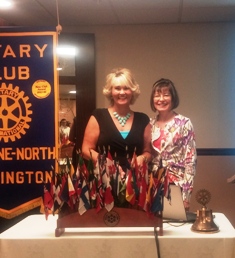Worker's Compensation - Suzanne Schmidt
Posted by Charles Rehberg
on Aug 31, 2015
Spokane North Notes
A weekly bulletin of the Spokane-North Rotary
August 31, 2015
Editors: Chuck Rehberg and Sandy Fink
Photos: Eric Johnson
Program coordinator: Brad Stark
Happy holiday!: No meeting next Monday, Sept. 7; enjoy your Labor Day holiday.
Prayers answered?: Club member Sister Bernie Nannyonjo announced that she now is serving part time as a chaplain at St. Joseph’s Care Center.
Kiwi bound?: Members Chris Lynch and Sandy Fink have applied for the District 5080 exchange study program with clubs in New Zealand.
Three words employers hate: workers’ comp rates
If you want to raise the blood pressure of local business owners just mention two topics – the business and occupations tax and workers’ compensation.
 Club members got some fresh insight on workers’ comp regulations at the Aug. 31 luncheon from Suzanne Schmidt, vice president and interim director of the Associated Builders and Contractors Inland Pacific Chapter.
Club members got some fresh insight on workers’ comp regulations at the Aug. 31 luncheon from Suzanne Schmidt, vice president and interim director of the Associated Builders and Contractors Inland Pacific Chapter. Schmidt substituted on short notice when the scheduled speaker’s wife went into labor with that couple’s third child.
Workers’ comp, she said, “is a complicated system and not a very functional system.”
Schmidt said workers’ comp in Washington is one of four “monopolistic systems” in the country, meaning that the state sets the rates and there is no competition on insurance costs.
“You can pay the state – and 95 percent of employers do – or be self-insured, which some of the very large companies like Boeing do,” she explained.
Rates are based per industry on three-year averages in three categories, she said. First is exposure, the type of work and number of hours worked at each business. Second is the number of claims and third is the severity and cost of claims.
The system, she said, provides incentives for safer workplaces. “It works like car insurance – the more tickets you get, or the more accidents you have, the higher the rates.”
Recent average base rates for workers’ comp include clerical, just 14 cents an hour; teachers, 30 cents; carpenters, $5 an hour and the highest, loggers, $18.66 an hour.
While the rates are based on the averages, Schmidt said, “they always go up.”
To minimize costs, she suggests that employers offer light-duty work quickly to cut time-loss, that they communicate regularly with injured workers and that they keep constant updates on the medical status of workers on leave.
Schmidt said of injured workers who are off two weeks, “about 90 percent come back to work. But among the workers off three months, just 50 percent ever work again.”
